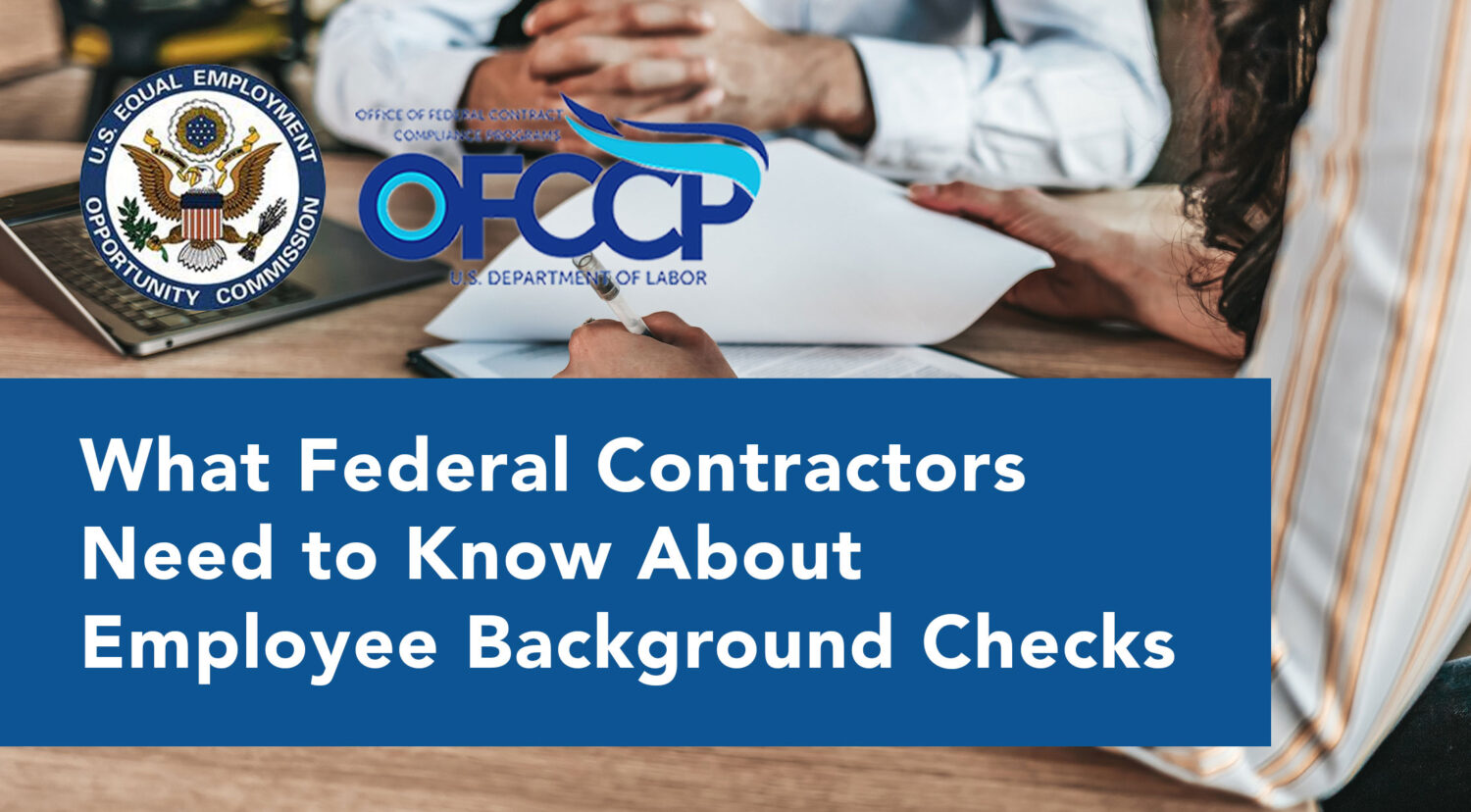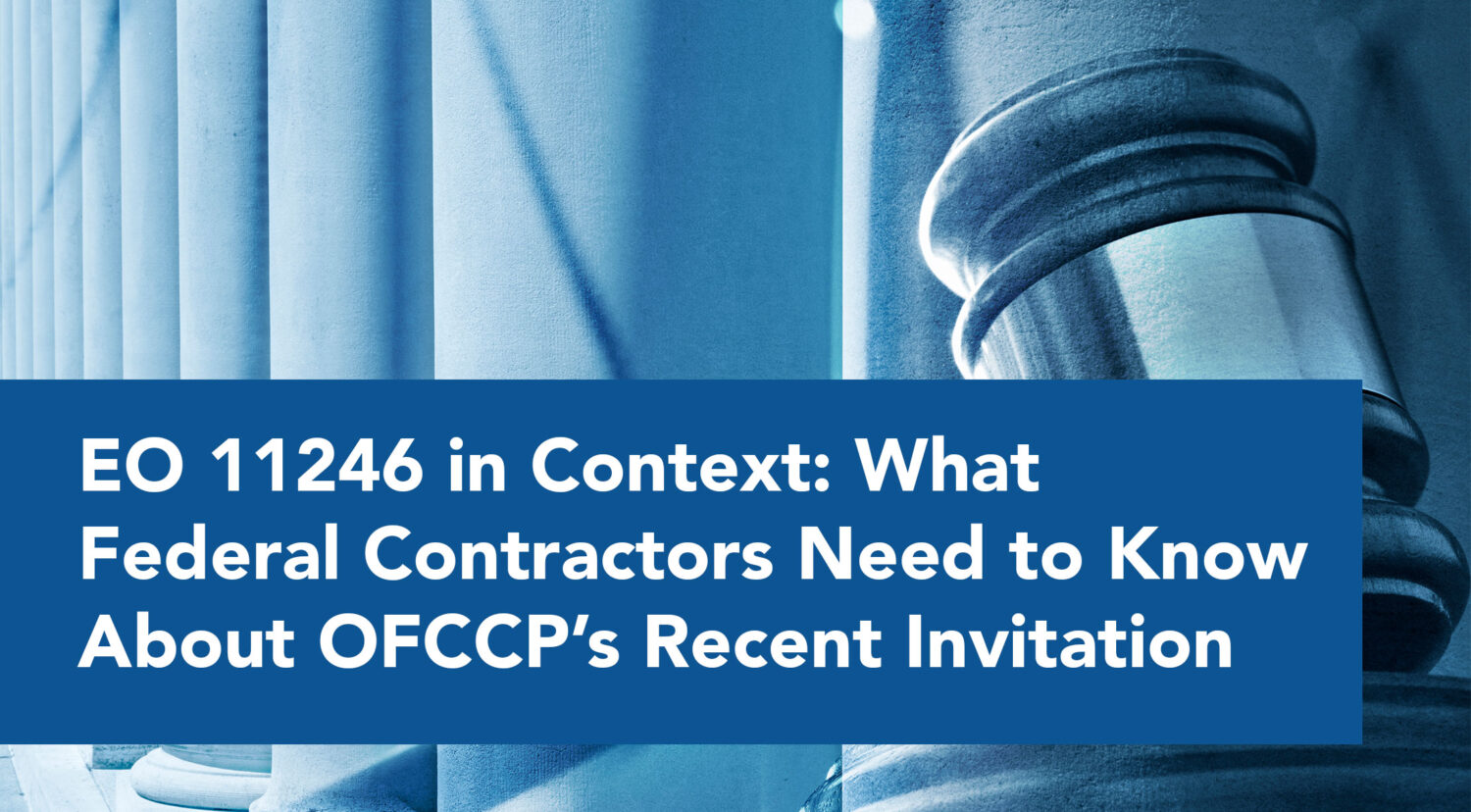

Many businesses are surprised to hear that conducting criminal background checks on applicants can put you in the crosshairs of anti-discrimination enforcers, like the Office of Federal Contract Compliance Programs (OFCCP), which ensures that federal contractors abide by equal employment and other rules. After all, the need to conduct background checks on prospective employees is often critical to ensuring you don’t hire an employee who might steal, mistreat your clients, or create an unsafe workplace for other workers. This is even more true for employees who may be working in sensitive sectors, like finance or defense, or with vulnerable populations such as children.
But don’t despair just yet. You can still run the background checks you need to ensure a safe and sound workplace—if you keep a few caveats in mind. Here’s what you need to know.
The Discrimination Problem with Criminal Background Checks
Title VII of the Civil Rights Act prohibits employment discrimination on the basis of race, creed, religion, color, sex, or national origin. Executive Order 11246 specifically applies Title VII to federal contractors and also requires those with 50 or more employees and contracts valued at $50,000 or more to take affirmative action to hire and advance diverse and inclusive candidates.
So what’s the problem with running a criminal background check?
Requiring criminal background checks of applicants—or applicants for certain positions—does not violate Title VII or EO 11246 on its face. However, certain practices can inadvertently result in a discriminatory impact by “hurting” a disproportionate number of people who belong to a protected class under Title VII.
For example, the Equal Employment Opportunity Commission (EEOC), which enforces anti-discrimination laws more broadly, has cited studies that show that African-Americans and Hispanics have significantly more arrests and convictions. As a result, the EEOC takes the position that blanket exclusion of all applicants with a criminal history has a discriminatory impact on African-Americans and Hispanics and violates equal employment protection rules.
This is where federal contractors need to take note. The OFCCP has specifically stated that it follows the EEOC’s practices, and in Directive 306, it explicitly adopted the EEOC position and practices with respect to the use of arrest and conviction records in making hiring decisions. This means that federal contractors need to take specific precautions when using criminal background checks to make hiring decisions.
What OFCCP Says About Using Criminal Background Checks in Hiring
Fortunately, the EEOC’s Enforcement Guidance (which the OFCCP closely follows) provides employers with some guidelines on how and when criminal background checks can be used in hiring decisions—without running afoul of EEOC and OFCCP rules.
First and foremost, employers must have a job-related reason to exclude a candidate based on the results of a criminal background check that is related to a “business necessity.” In determining this, the EEOC, relying on court precedent, says the following factors should be taken into consideration:
- The nature and gravity of the offense;
- Time elapsed since the conviction and/or completion of the sentence; and
- Nature of the job held or sought.
Simply put, if one’s criminal past is not relevant to the essential functions of a particular job or some other compelling business necessity, the employer should not exclude the applicant on that basis. For example, if Betty applies for a job as a bookkeeper and was convicted two years ago for embezzlement, that is relevant to the job. Rejecting her is justified even under the EEOC’s analysis and guidelines. On the other hand, a conviction for public drunkenness one time seven years ago may not be a justifiable basis for refusing her a job as a bookkeeper.
Best practices to avoid discrimination in background checks
The EEOC’s guidance further offers a list of best practices for employers who are considering using criminal background information in making employment decisions. The guidance (in italics below) specifically states:
General:
- Eliminate policies or practices that exclude people from employment based on any criminal record. Employers cannot have blanket exclusions of those with criminal pasts. (So this is a blanket exclusion of blanket exclusions?? Maybe.)
- Train managers, hiring officials, and decision-makers about Title VII and its prohibition on employment discrimination. Title VII of the Civil Rights Act of 1964 is the law that prohibits employment discrimination against certain classes of people identified therein (i.e. “protected classes”). The EEOC wants employers to sensitize their managers to these laws, and how otherwise neutral practices can have a discriminatory impact on the people who Title VII is designed to protect. Ideally, training managers about Title VII and related laws should not be new.
Developing a Policy:
- Develop a narrowly tailored written policy and procedure for screening applicants and employees for criminal conduct (that does the following):
-
- Identify essential job requirements and the actual circumstances under which the jobs are performed.
- Determine the specific offenses that may demonstrate unfitness for performing such jobs
- Identify the criminal offenses based on all available evidence.
- Identify the criminal offenses based on all available evidence.
- Determine the duration of exclusions for criminal conduct based on all available evidence.
- Include an individualized assessment.
- Include an individualized assessment.
- Record the justification for the policy and procedures.
- Note and keep a record of consultations and research considered in crafting the policy and procedures.
- Identify essential job requirements and the actual circumstances under which the jobs are performed.
- Train managers, hiring officials, and decision-makers on how to implement the policy and procedures consistent with Title VII.
In short, the EEOC and OFCCP want employers to implement policies that consider the relationship of the criminal offense(s) to the essential job requirements, especially if they are “old,” the potential for rehabilitation, and whenever possible, to evaluate on a case by case basis. If an employer rejects an applicant based on criminal history, it should record the decision and the justification and, once it has created a policy and procedures, train those it expects to be implementing them. (NOTE: According to the EEOC, arrests alone are not themselves evidence of criminal conduct, though the underlying conduct leading to the arrest, if related to job functions or business necessity can be considered.)
Questions about Criminal Records:
- When asking questions about criminal records, limit inquiries to records for which exclusion would be job-related for the position in question and consistent with business necessity.
Employers should, whenever possible, only ask about items related to the actual job or a specific business necessity. If the report refers to something that is not related to the job, the employer should not ask about it.
Confidentiality:
- Keep information about applicants’ and employees’ criminal records confidential. Only use if for the purpose for which it is intended.
Other Fair Hiring Considerations
In addition to EEOC and OFCCP rules, employers must also abide by Fair Credit Reporting Act (FCRA) restrictions when obtaining an applicant’s criminal history information from a consumer reporting agency. Specifically, the FCRA requires employers to get permission from an applicant to obtain a criminal history report and to provide the applicant with specific notices and rights in the event they are not hired based on the report.
Background checks aside, organizations should monitor and analyze their hiring and recruitment practices to ensure they do not disadvantage people of color and other minority groups. This includes ensuring the selection criteria for hiring do not disproportionately exclude certain groups unless the criteria are valid predictors of successful job performance and meet the employer’s business requirements. Organizations should also implement practices to widen and diversify the pool of candidates for job openings, for example, outreaching to community organizations, apprenticeship programs, and developing employees with potential talent.
To learn more, don’t miss our complimentary webinar Background Checks. If you need help with your AAP compliance efforts, HR Unlimited Inc. can help! Our comprehensive affirmative action services assist you in all phases of affirmative action compliance. Contact us today to learn more about the many benefits of our Affirmative Action Partnership!





